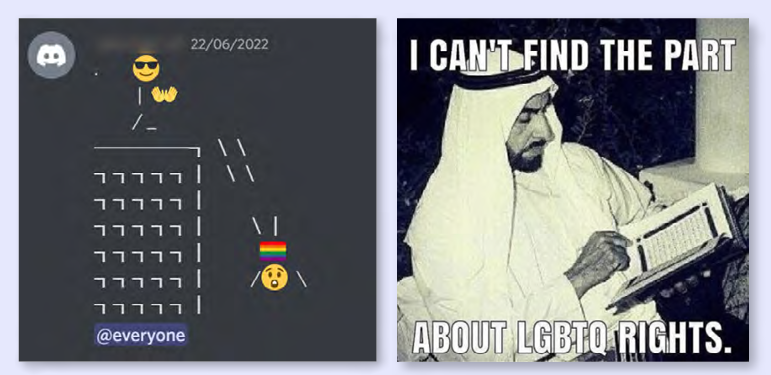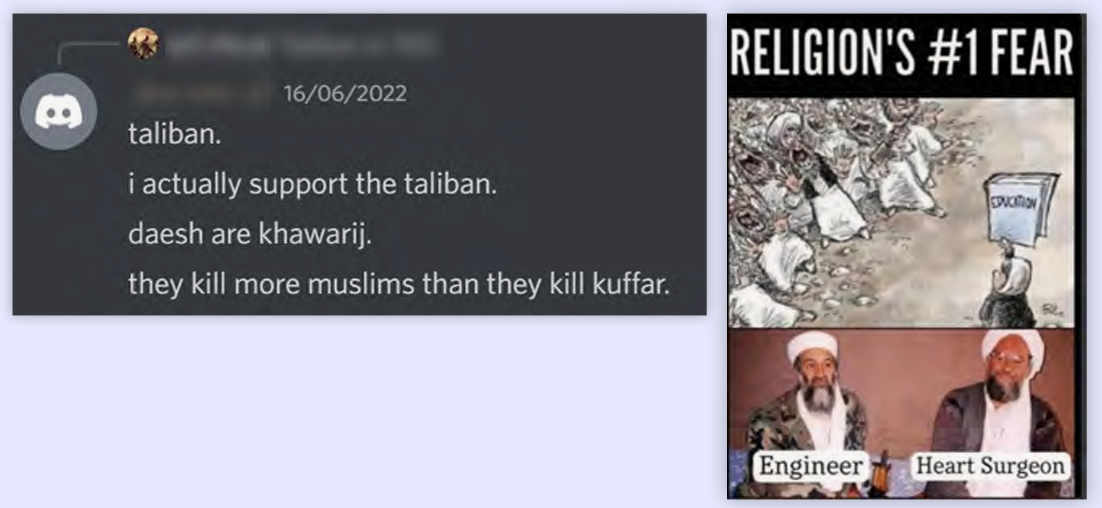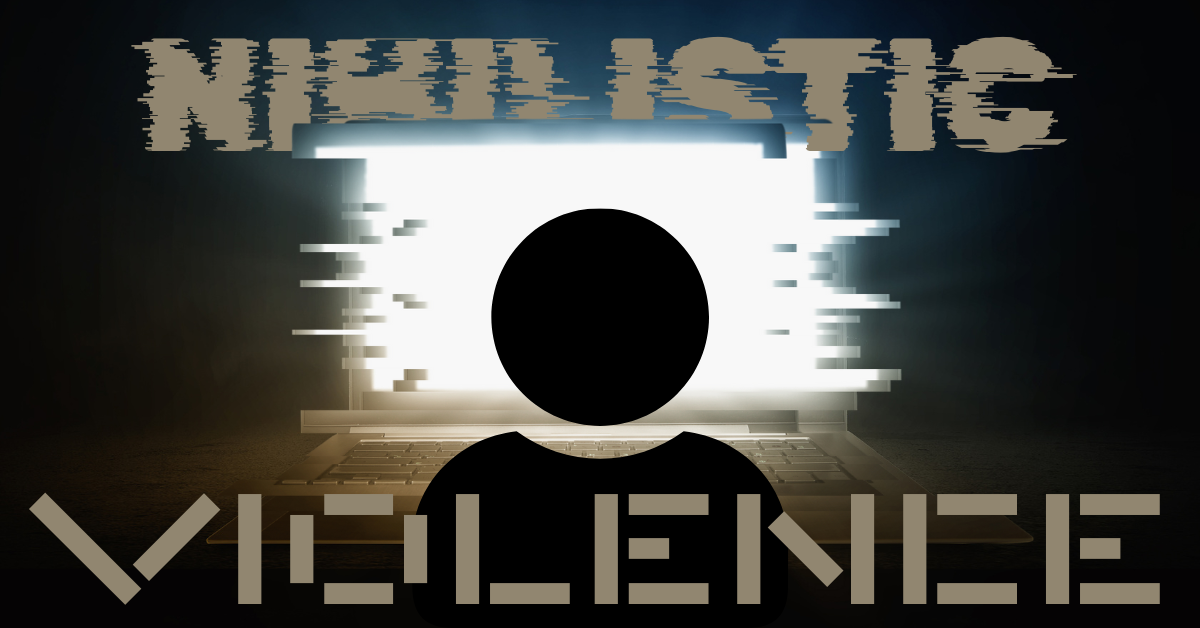Case study: Alt-platform Discord, a haven for Islamist and Catholic extremist activity
19 May 2023
By Jakob Guhl
This Dispatch is based on one of three research case studies from ISD and CASM Technology’s report Researching the Evolving Ecosystem: Telegram, Discord and Odysee. The project investigated research methodologies for monitoring and analysing smaller platforms to better inform the debate around research tools that could be equally systematic, ethical and legal. While the general report outlines the research phase of the project by ISD and CASM, funded by Omidyar Network, here we will focus on the thematic findings from researching Discord (the only English-language case study from the investigation).
__________________________________________________________________________
Discord is a free video-gaming platform designed to assist gamers in communicating with each other while playing. Since its debut in 2015, Discord’s userbase has grown dramatically; it is currently estimated to have 140 million monthly active users worldwide and a total of 6.7 million active servers (servers are spaces created by communities or individuals and can be public or invitation only).
Even though Discord is primarily aimed at gamers and designed for non-political purposes, the platform’s role in a diverse range of online-subcultures adjacent to extremism and violence has been repeatedly highlighted. Recent examples include the 2022 Buffalo shooting and the Highland Park Parade shooting of that same year. In both cases, the attackers’ digital footprint contained messages left on Discord, including content that documented their planning and preparation. In April 2023, we also saw the case of the US National Guardsmen Jack Teixeira who was arrested after allegedly leaking classified US intelligence files (the so-called ‘Pentagon Files’) to a Discord chat, where he had previously posted racist and violent comments.
As part of a wider project funded by Omidyar Network, ISD aimed to identify the online spaces used by extremist, hate and disinformation actors and communities as they increasingly move away from mainstream social media platforms. During the second phase of this project, ISD tested existing research methodologies to analyse the technical, legal, ethical, and fragmentation barriers that constrain researchers analysing smaller social media platforms: Telegram, Discord and Odysee (in German, English and French respectively). Our full report on the second phase of this project discusses the methodological approaches and their implications for digital policy in-depth.
The English-language research case study focused on Discord communities promoting two types of religious extremism, Catholic extremists and Islamist extremists. We selected these communities as previous research by ISD on Discord had shown that both Islamist extremists and the extreme right have a presence on the platform. Given the increased reporting around a growing interest within the US far right in concepts such as Catholic Integralism and traditionalism, including among adherents of the far-right America First and ‘Groyper’ movements that have mobilised on Discord, [1] ISD chose to focus specifically on hateful and violent content in Catholic Integralist and traditionalist servers. Our findings point towards a significant presence of hateful, anti-democratic and violent content within these communities.
Overview of the Servers
ISD researchers identified support for Catholic extremist views in 31 servers on Discord, with an overall total of 9,585 followers in late August 2022, and support for Islamist extremism in 16 Discord servers with a cumulative 4,757 followers during the same time frame.
It should be noted that despite community-building being one of Discord’s main purposes, there is significant diversity within as well as between servers. It is therefore more accurate to say that our analysis focused on Catholic integralism and Islamist extremism activity within Discord servers where other topics are also discussed, rather than servers that are exclusively focused on Catholic integralism or Islamist extremism. Despite this, server rules often state that comments may not violate religious teachings, offend believers or attack religious authorities, and that users may be expelled for breaking these rules. Additionally, irony and gamification (i.e. the application of video game elements to – in this case – facilitate radicalisation, promote extremist views or design extremist or terrorist content) are prominent in most servers. It is often unclear whether users actually support authoritarian religious states or movements or merely find them aesthetically interesting or ‘cool’ [2].
Users in both Catholic extremist and Islamist extremist servers often outline their vision for an ideal society. Sometimes admins will state their positions in the server rules. In line with ISD’s definition of extremism, these utopian visions generally claim the superiority and dominance of one identity-based ‘in-group’ (in this case Catholics or Muslims) over all ‘out-groups’, thereby advancing a world view that appears incompatible with pluralism and universal human rights. The exact form the ideal Catholic state would take is unclear; researchers identified users supporting left-wing anti-capitalist integralists, fascists, monarchists and Christian nationalists, among others.

Figure 1: Figures and memes shared in Catholic extremist and Islamist Discord servers expressing opposition to human rights and trans rights, as well as advocating for a totalitarian religious state.
Among Islamist extremists, calls to re-establish a totalitarian modern version of the Caliphate that would unify all Muslims are also common. In this Caliphate, all aspects of life, including political, scientific and spiritual matters, would be subjugated to Islamist extremist interpretations of Islam. This includes a strict legalist interpretation of the Sharia, comprising corporal punishments and limits on freedom of belief, freedom of expression and the rights of sexual and religious minorities. Sunni Islamist extremists in the analysed Discord servers reserved particular scorn for Shia Muslims, Sufis, atheists and liberal Muslims.

Figure 2: Ironic memes found in Catholic extremist servers that make fun of clichés relating to Catholic extremist online-subcultures.
Hateful Rhetoric
The following sections outline different types of hateful and offensive content targeting out-group communities that was identified in the various servers. While the exact shape of an ideal society can be hotly debated, these communities are united by their hate against all out-groups and those regarded as political enemies. Hateful rhetoric targeting groups considered ‘despicable’ or ‘abnormal’ therefore helps these communities to establish what is considered ‘normal’ or ‘based’ [3] and form an in-group identity.’
Some server admins appear aware that the ideological leanings of their communities could come into conflict with Discord’s policies around hate speech or the promotion of violent extremist content. For example, two Catholic servers asked their members in their rules to try to not target protected groups or ‘BAME’ communities (‘Black, Asian and Minority Ethnic’ – this server was likely linked to the UK where this acronym has been most commonly used) to not violate Discord’s Terms of Service (TOS) [4].
Among both Catholic extremist and Islamist extremist users on Discord, hate against LGBTQ+ communities serves as a unifying factor. Despite the ideological divergence on many issues within these servers, there appears to be a near-consensus in the rejection of homosexuality as well as trans rights. During discussions in both extremist servers, users generally articulated what they perceive to be the normative position of their religions.

Figure 3: Anti-LGBTQ+ comments and memes celebrating the death penalty for homosexuals by throwing them off a roof and mocking the idea that Islamic scripture is compatible with LGBTQ rights.
Antisemitism similarly unites Catholic and Islamist extremist servers on Discord. Both often emphasise religiously grounded antisemitism that draws on persistent, historical forms of antisemitism. While antisemitic narratives among Islamist extremists are at times loosely connected to hatred of Israel, most of the antisemitic content within both Catholic and Islamist extremists on Discord is unconnected to Israel, instead portraying Jews as Satanists (or even controlling Satan), demons, greedy or sub-human. Other content claims that Judaism is not just demonic but also intertwined with advocacy for trans rights; this is a popular talking point in far-right circles, one which argues that Jews are trying to weaken patriarchal societies by undermining binary gender norms.

Figure 4: Memes attacking Jews, Protestants, Muslims and trans people.
Opposition to feminism is another unifying factor both within and between Catholic and Islamist extremist servers on Discord. Users often mock feminists or complain about feminists being ‘triggered’ by their views on gender norms. One common angle to attack feminism is claiming that traditional gender and family norms would in fact make women happier while feminist values produce old, childless, lonely and regretful women.

Figure 5: Meme mocking women for not conforming to traditionalist gender roles, and screenshot of a video fantasising about killing women’s rights advocate Malala Yousafzai.
Another more frequent form of opposing feminism and women’s rights found among Catholic extremist servers is opposition to abortion (while there is some diversity of views within Islam as well as among Islamists, opposition to abortion under all circumstances is relatively rare). Users in Catholic servers generally praised the overturning of Roe v. Wade in June 2022, with a left-wing Integralist server even denouncing the right to abortion as ‘individualist and intertwined with liberalism’, arguing that this was why Khrushchev had legalised abortion as part of his ‘de-Stalinisation’ reforms in the 1950s. In some Islamist extremist servers supportive of the Taliban, users also expressed opposition to women’s rights to education. One video dreamed of travelling back in time in order to make sure Malala Yousafzai’s assassins were trained well enough to actually kill her [5].
Violent Rhetoric
Violent rhetoric can include a range of content, including implying that violence is necessary; celebrations of, or support for, known violent offenders or groups; calls to join violent movements; non-specific calls for violence or even instructional material and information that could leave individuals or groups exposed to violence.
While there were few specific calls for violence in our Discord analysis, researchers identified a range of unspecific calls for violence, celebrations of violence and posts that implied a need for violence, especially within Islamist extremist servers. For example, users expressed hope that God would allow the Mujahideen (those who engage in Jihad) to kill homosexuals and their supporters, or to initiate an insurgency against the Pakistani state. Some memes portrayed the killings of Westerners or the hanging of Hindus (depicted as Pepe the Frog characters named Pajeet, a derogatory online term used to refer to Indians).

Figure 6: Comments calling for the execution of Indians (symbolised through the name Pajeet), and calling on God to kill homosexuals.
Within Islamist extremist servers, users similarly expressed support for extremist and terrorist organisations, including ISIS, al-Qaeda, the Taliban and Hamas. This included the sharing of official ISIS and Taliban content (including execution videos) and the creation of their own memes and video game graphics that celebrate extremist or terrorist groups. Interestingly, pro-ISIS content and comments appear to be particularly controversial and tend to trigger more critical reactions than statements supportive of other Islamist extremist movements; for example, the Taliban seem to enjoy more support, with a wide variety of memes celebrating their successful re-establishment of the Islamic Emirate of Afghanistan in September 2021.

Figure 7: Posts expressing support for the Taliban and ridiculing the idea that religion could be undermined by education by pointing out that the late al-Qaeda leaders Osama bin Laden and Ayman al-Zawahiri were trained as engineers and heart surgeons respectively.
It should be noted that this does not indicate a coherent ideology within the servers analysed. Firstly, the different extremist groups often opposed each other; for example, the Taliban, al-Qaeda and Hamas oppose ISIS. In the case of Afghanistan, for example, the Taliban and ISIS-K (the Afghan branch of ISIS) are engaged in military combat with each other. Secondly, as previously noted, there is often a diversity of ideological views within servers, and disagreement between users is common.

Figure 8: Memes and video game graphics expressing support for the Taliban.
Violent rhetoric was less frequent within the Catholic integralist servers analysed. However, users and admins at times implied that there was a need for violence to fight ‘degeneracy and the modern society.’ In one instance, a user similarly shared a quote by 2015 Charleston shooter Dylann Roof that asks readers to start fighting for the ‘white race’ rather than for alleged Jewish interests (see the previous section on Hateful Rhetoric). Lastly, there were some memes shared that centred around the mythical figure of St. James the Moor Slayer and celebrated the killings of Muslims.

Figure 9: Memes centred around the mythical figure of St. James the Moor Slayer, which celebrates the killings of Muslims, and a quote by Charleston shooter Dylann Roof.
Conclusion
Our analysis of Catholic and Islamist extremist Discord servers suggests that there is a small but significant presence of harmful communities that share, at times, very extreme, hateful, anti-democratic and violent content. It should be noted that our findings likely only show a fraction of the true scale of similar activity on the platform, as Discord’s TOS prohibit the collection of user data via its API, thereby limiting researchers to qualitative rather than systematic analysis.
We contend that platforms should provide permissioned data access to third-party researchers conducting public interest research. Such research on extremist communities is critical to provide the evidence base for policymakers to design legislation and civil society to trial countermeasures to curb the radicalisation within some Discord servers. Data access should be accompanied by clear, consistent and accessible documentation that includes guidance on the types of data that can be collected and sufficient limits on the collection of sensitive personal data to protect user privacy.
The full report can be found on our website.
[1] https://www.salon.com/2022/05/13/trad-catholics-and-nationalist-groypers-forge-a-new-far-right-youth-movement/
[2] Schlegel, Linda. “Jumanji Extremism? How games and gamification could facilitate radicalization processes.” Journal for Deradicalization 23 (2020): 1-44.
[3] Based is a slang term that originally meant being addicted to crack cocaine, though it was first re-appropriated by rapper Lil B to mean behaving authentically, and then by the online far-right to describe things in line with their anti-progressive values.
[4] Discord’s Community Guidelines state: “Do not organize, promote, or participate in hate speech or hateful conduct. It’s unacceptable to attack a person or a community based on attributes such as their race, ethnicity, caste, national origin, sex, gender identity, gender presentation, sexual orientation, religious affiliation, age, serious illness, disabilities, or other protected classifications.” https://discord.com/guidelines
[5] Malala Yousafzai is a Pakistani human rights advocate and Nobel Peace Prize Laureate who was shot in 2012 by the Taliban for her activism for the right of every child, specifically including girls, to receive an education.



